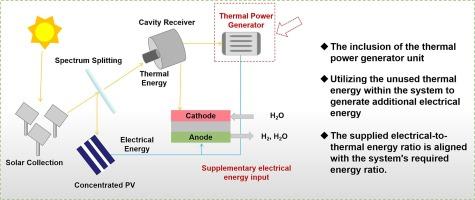通过聚光光伏热发电机-固体氧化物电解槽系统进行全光谱太阳能水分解制氢
IF 9.9
1区 工程技术
Q1 ENERGY & FUELS
引用次数: 0
摘要
本研究介绍了一种新型太阳能聚光光伏-热发电机-固体氧化物电解池系统,旨在通过优化电能和热能的利用来提高制氢效率。该系统集成了热能发电机,可将多余的高温热能转化为电能,从而解决与高温水电解相关的能量损失问题。热力学分析表明,集成热能发电机可将能量效率和放能效率分别提高到 0.60 和 0.52,同时将最佳运行温度降低到 1173 K。温度升高可提高氢气产量和效率,但电压升高会对热力学效率产生负面影响。这些研究结果表明,与传统的太阳能制氢方法相比,拟议的系统有了很大的改进,使其成为可持续制氢的理想选择。进一步的研究将集中于系统集成、材料成本和商业用途的可扩展性。本文章由计算机程序翻译,如有差异,请以英文原文为准。

Full-spectrum solar water decomposition for hydrogen production via a concentrating photovoltaic-thermal power generator-solid oxide electrolysis cell system
This study introduces a novel solar-powered concentrating photovoltaic-thermal power generator-solid oxide electrolysis cell system designed to enhance hydrogen production efficiency by optimizing both electrical and thermal energy utilization. The system incorporates a thermal power generator to convert excess high-temperature thermal energy into electrical energy, addressing energy losses associated with high-temperature water electrolysis. Thermodynamic analysis shows that the integration of the thermal power generator improves energy and exergy efficiencies to 0.60 and 0.52, while lowering the optimal operating temperature to 1173 K. The system’s efficiency is sensitive to the proportion of electrical energy supplied by the thermal power generator, with an optimal range identified between 0.1 and 0.2. Higher temperatures improve hydrogen production and efficiency, but increased voltage negatively impacts thermodynamic efficiency. These findings demonstrate that the proposed system offers substantial improvements over conventional solar hydrogen production methods, making it a promising candidate for sustainable hydrogen production. Further research will focus on system integration, material costs, and scalability for commercial use.
求助全文
通过发布文献求助,成功后即可免费获取论文全文。
去求助
来源期刊

Energy Conversion and Management
工程技术-力学
CiteScore
19.00
自引率
11.50%
发文量
1304
审稿时长
17 days
期刊介绍:
The journal Energy Conversion and Management provides a forum for publishing original contributions and comprehensive technical review articles of interdisciplinary and original research on all important energy topics.
The topics considered include energy generation, utilization, conversion, storage, transmission, conservation, management and sustainability. These topics typically involve various types of energy such as mechanical, thermal, nuclear, chemical, electromagnetic, magnetic and electric. These energy types cover all known energy resources, including renewable resources (e.g., solar, bio, hydro, wind, geothermal and ocean energy), fossil fuels and nuclear resources.
 求助内容:
求助内容: 应助结果提醒方式:
应助结果提醒方式:


